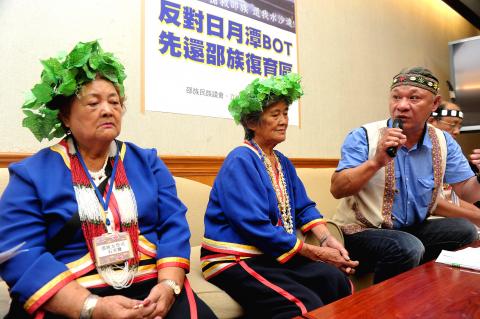Representatives from the Thao people — the original inhabitants of the area surrounding Sun Moon Lake (日月潭) in Nantou County — yesterday criticized the government for giving initial approval to a tourist resort project within their traditional territory on Hsiangshan (向山) without gaining the tribe’s permission in advance.
The build-operate-transfer (BOT) development project for the Hsiangshan tourist resort, financed by Hong Kong’s Bonds Group and given a real-estate development contract in 2009, gained initial approval from the Environmental Impact Assessment (EIA) specialist ad hoc meeting earlier this month.
However, Thao National Council chairman Banu Bagamumu said his tribe, which is now one of the smallest ethnic groups in Taiwan, with only about 700 people, was not consulted. He also accused the Council of Indigenous Peoples (CIP) of not standing up for the Thaos’ rights at the meetings.

Photo: CNA
Taiwan First Nations Party founding chairman Runquan Lhkatafatu (石慶龍), a Thao, said that after the Tourism Development and Promotion Committee last year said the area was not a traditional territory by law, the developer only held an information session for local residents earlier this year, without consulting tribe members.
Under Article 21 of the Aboriginal Basic Act (原住民基本法), developers should consult Aborigines and obtain their consent or participation, and share with them the benefits generated from developments in their territory.
Banu Bagamumu added that in 2008, the Cabinet authorized a plan for a 1,892 hectare Thao culture and living restoration park to be established in the area surrounding the Sun Moon Lake, with an approved budget of NT$553 million (US$18.46 million) over four years, but the county government keeps on postponing the execution of the plan, neglecting the rights to livelihood of the Thao.
“Already, five years have passed, less than 10 percent of the plan has been i executed and we feel despair that we have been fooled and deceived,” Runquan Lhkatafatu said, adding that the Nantou County Government is at fault for refusing to enforce the plan, and the Council of Indigenous Peoples is at fault for being inactive.
In response, deputy director of the council’s Department of Land Management Hsieh Ya-chieh (謝亞杰) said the council has always insisted that the planned development area is within the Thao traditional territory and that the developers must negotiate with tribe members.
Even after the Ministry of Justice said that claiming the traditional territory does not give it legal rights, the council still urged the EIA committee members to consider Article 19 of the EIA Act, which stipulates that activities that will cause significant negative affects to ethnic minority groups’ traditional living should be considered severe environmental impacts, he said, “but the committee members did not accept it.”
Sun Moon Lake National Scenic Area Administration Tourism Bureau secretary Chen Chih-shian (陳志賢) said the bureau proposed the plan in a bid to deal with the increasing number of tourists every year, and also plans to build cables between Hsiangshan and Jiji Township (集集) for gondola lifts.
Banu Bagamumu said that if the government does not respect their tribe and implement the restoration park plan, they will file a lawsuit with the International Court of Justice.

Taipei, New Taipei City, Keelung and Taoyuan would issue a decision at 8pm on whether to cancel work and school tomorrow due to forecasted heavy rain, Keelung Mayor Hsieh Kuo-liang (謝國樑) said today. Hsieh told reporters that absent some pressing reason, the four northern cities would announce the decision jointly at 8pm. Keelung is expected to receive between 300mm and 490mm of rain in the period from 2pm today through 2pm tomorrow, Central Weather Administration data showed. Keelung City Government regulations stipulate that school and work can be canceled if rain totals in mountainous or low-elevation areas are forecast to exceed 350mm in

EVA Airways president Sun Chia-ming (孫嘉明) and other senior executives yesterday bowed in apology over the death of a flight attendant, saying the company has begun improving its health-reporting, review and work coordination mechanisms. “We promise to handle this matter with the utmost responsibility to ensure safer and healthier working conditions for all EVA Air employees,” Sun said. The flight attendant, a woman surnamed Sun (孫), died on Friday last week of undisclosed causes shortly after returning from a work assignment in Milan, Italy, the airline said. Chinese-language media reported that the woman fell ill working on a Taipei-to-Milan flight on Sept. 22

COUNTERMEASURE: Taiwan was to implement controls for 47 tech products bound for South Africa after the latter downgraded and renamed Taipei’s ‘de facto’ offices The Ministry of Foreign Affairs is still reviewing a new agreement proposed by the South African government last month to regulate the status of reciprocal representative offices, Minister of Foreign Affairs Lin Chia-lung (林佳龍) said yesterday. Asked about the latest developments in a year-long controversy over Taiwan’s de facto representative office in South Africa, Lin during a legislative session said that the ministry was consulting with legal experts on the proposed new agreement. While the new proposal offers Taiwan greater flexibility, the ministry does not find it acceptable, Lin said without elaborating. The ministry is still open to resuming retaliatory measures against South

1.4nm WAFERS: While TSMC is gearing up to expand its overseas production, it would also continue to invest in Taiwan, company chairman and CEO C.C. Wei said Taiwan Semiconductor Manufacturing Co (TSMC) has applied for permission to construct a new plant in the Central Taiwan Science Park (中部科學園區), which it would use for the production of new high-speed wafers, the National Science and Technology Council said yesterday. The council, which supervises three major science parks in Taiwan, confirmed that the Central Taiwan Science Park Bureau had received an application on Friday from TSMC, the world’s largest contract chipmaker, to commence work on the new A14 fab. A14 technology, a 1.4 nanometer (nm) process, is designed to drive artificial intelligence transformation by enabling faster computing and greater power